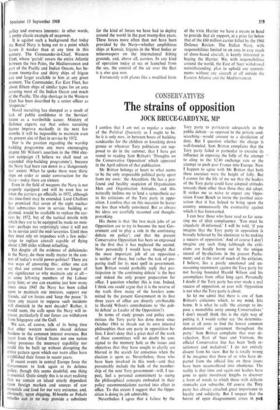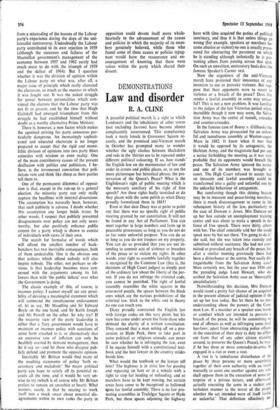The strains of opposition
CONSERVATIVES JOCK BRUCE-GARDYNE, MP
I confess that I am not as regular a reader of the Political Quarterly as I ought to be. So it is only now, in between bouts of building sandcastles for the children or knocking down grouse or whatever Tory politicians are sup- posed to do in the summer, that I have got round to reading Sam Brittan's 'Thoughts on the Conservative Opposition' which appeared in the April edition of that publication.
Mr Brittan belongs at heart to what seems to be the only respectable political party apart from my own: the Anarchists. He has a pro- found and healthy suspicion of Organisation Men and Organisation Attitudes, and this naturally inclines me to lend a sympathetic ear to his criticisms of the Tory party in oppo- sition. I confess that on this occasion he leaves me less than wholly convinced. But as always his ideas are carefully reasoned and thought- provoking.
His theme is that 'the two main jobs of an Opposition are to try to become the next Gov- ernment and to play a role in the continuing debate on policy': and that the present Conservative Opposition has been so engrossed in the first that it has neglected the second. Now personally I would have thought that the most important job of an opposition is neither of these, but rather the task of pre- paring itself for its next spell in government. Sam Brittan would probably reply that par- ticipation in 'the continuing debate' is the best and indeed the only proper preparation for office. I question whether this is true. Indeed, I think one could argue that it is the reverse of the truth• (how many of the howlers com- mitted by the present Government in its first three years of office are directly attributable to Harold Wilson's contributions to 'the pub- lic debate' as Leader of the Opposition?).
In terms of study groups and policy com- mittees the Tory party has done more since October 1964 to thrash out its own internal philosophies than any party in opposititon be- fore. I don't deny that a great deal of the work of these committees will no doubt be con- signed to the memory hole as the issues and objectives that they have sought to clarify are blurred in the search for consensus when the election is upon us. Nevertheless, those who have been involved in this work—and they presumably include the bulk of the member- ship of the next Tory government—will, I sus- pect,, feel a personal commitment to seeing the philosophical concepts embodied in their policy recommendations carried into effect in office. To this extent I suggest that the Oppo- sition is doing its job admirably.
Nevertheless I agree that a failure by the Tory party to participate adequately in the public debate—as opposed to the private soul- searching—would amount to a dereliction of duty. But I question whether the charge is well-founded. Sam Brittan complains that the Tory party failed in particular to exercise its influence in exposing the folly of the attempt to cling to the $2.80 exchange rate or the attempt to push past France into Europe. Now I happen to agree with Mr Brittan that both these exercises were the height of folly. But I cannot for the life of me see that the leaders of the Tory patty could have adopted attitudes towards them other than those they did adopt. It strikes me as naïve to expect any Oppo- sition Front Bench to invite the justified accu- sation that it has helped to bring upon the country unnecessarily the eventuality against which it has forewarned.
I can hear those who have read so far accu- sing me of idiot complacency. 'You must be singularly ill-informed,' I will be told, 'if you imagine that the Tory party in opposition is broadly believed by the electorate to be making a success of opposition.' And of course I don't imagine any such thing (although the criti- cisms are hardly borne out by the unique record of by-elections in the present Parlia- ment; and at the root of much of the criticism, I believe, lies a purely emotional and un- reasoning resentment against the Tory party for not having hounded Harold Wilson and his accomplices from office long ago). Personally I doubt if the Tory party has ever made a real success of opposition, or ever will. Opposition is not what the Tory party is about.
So let me admit that there is one of Sam Brittan's criticisms which, to my mind, hits home. It is what he calls 'the attempt to im- pose a monolithic unity among Conservatives.' I don't myself think this is the right way of putting it. I would rather say 'the determina- tion at all costs to find the lowest common denominator of agreement throughout the party.' Sam Brittan complains that over de- valuation, East of Suez and Vietnam, the official Conservative line has been 'both re- actionary and maladroit.' I do not entirely dissent from his view. But he is totally wrong if he imagines that those of us who have de- parted from the official line on these issues have been steamrollered into obedience. The reality is that time and again out leaders have gone to quite inordinate lengths to discover a form of words to which those with delicate stomachs can subscribe. Of course the Tory party has always attached great importance to loyalty and solidarity. But I suspect that the horror of open disagreements arises in past from a misreading of the lessons of the Labour party's experience during the days of the uni- lateralist controversy. Undoubtedly the Labour party contributed to its own rejection in 1959 (although the successes and failures of the Macmillan government's management of the economy between 1957 and 1962 surely had much more to do with the triumph of 1959 and the defeat of 1964). But I question whether it was the division of opinion within the Labour party on what was, after all, a major issue of principle which really alienated the electorate, so much as the manner in which it was fought out. It was the naked struggle for power between personalities which con- vinced the electors that the Labour party was not fit to govern; and by the time that Hugh Gaitskell had emerged triumphant from this struggle he had established himself without doubt as a worthy alternative Prime Minister.
There is, however, a new factor which makes the agonised striving for party consensus par- ticularly dangerous. An increasingly sophisti- cated and educated electorate is no longer prepared to accept that the rigid and mono- lithic division of opinions into two party blocs coincides with wisdom or even reality. One of the main contributory causes of the present disillusion with politics and politicians, I be- lieve, is the (erroneous) conviction that poli- ticians vote and think like sheep as their parties tell them to.
One of the permanent dilemmas of opposi- tion is that, except in the run-up to a general election, the minority party can only really • capture the headlines with internal dissensions. The assumption has naturally been, however, that such publicity is adverse. I doubt whether this assumption any longer holds water. In - other words, I suspect that publicly presented disagreements over policy are not only news- worthy, but also positively enhance public esteem for a party whicI2 is shown to consist of individuals with views of their own.
The search for formulae of words which will offend the smallest number of back- benchers has two inevitable consequences, both of them undesirable. One is the obvious one that policies which offend nobody will also inspire nobody. The other, not perhaps so ob- vious, is that leadership becomes more con- cerned with the arguments among its fol- lowers than with 'the public debate' over what the Government is doing.
The classic example of this, of course, is incomes policy. I cannot myself see any possi- bility of devising a meaningful statement which will command the simultaneous endorsement of, let us say, Mr Maudling and Sir Edward Boyle on the one hand, and Sir Keith Joseph and Mr Powell on the other. So why try? If the majority view of the party leadership is either that a Tory government would have to maintain an incomes policy with sanctions of some form attached to it. or alternatively that an excessive rate of inflation can only be healthily averted by demand management, then let it say so—and let those who disagree pub- licly defend and promote the opposite opinion.
Inevitably Mr Brittan would find many of the resulting statements of policy 'both re- actionary and maladroit.' No major political party can hope to satisfy all its potential re- cruits all the time, and it would be very un- wise to try (which is of course why Mr Brittan prefers to remain an anarchist at heart). What matters, surely, is that by ceasing to work itself into a muck sweat about potential dis- agreements within its own ranks the party in
opposition could devote itself more whole- heartedly to the advancement of the causes and policies in which the majority of its mem- bers genuinely believed, while those who found some of these causes or policies repug- nant would have the reassurance and en- couragement of knowing that there were voices within the party which shared their dissent.



































 Previous page
Previous page